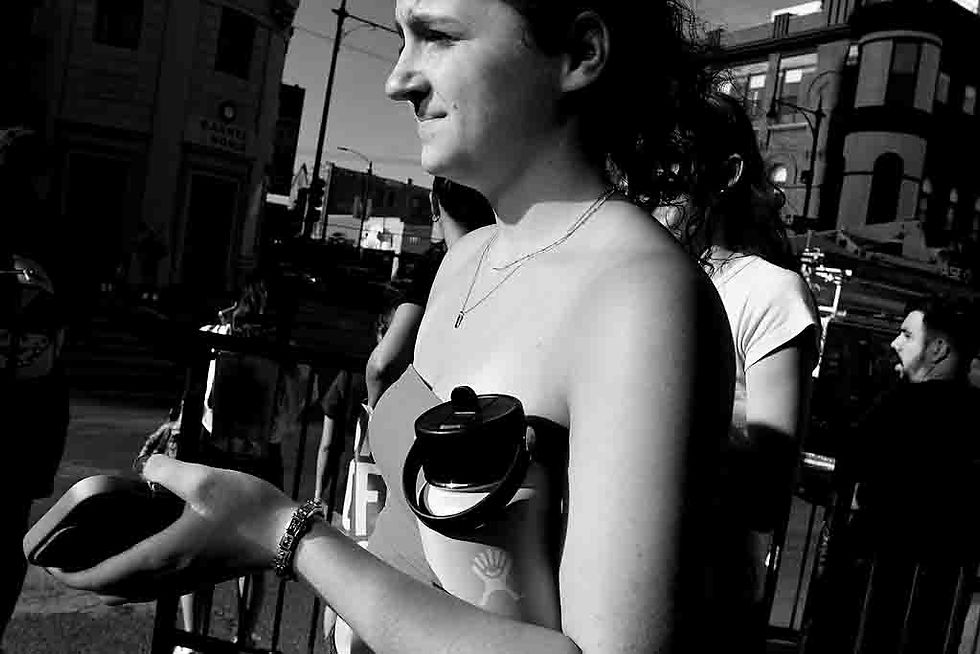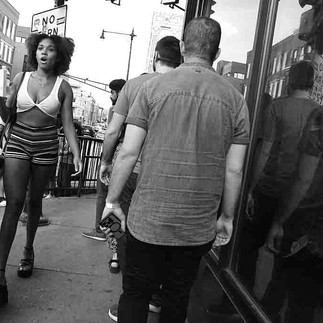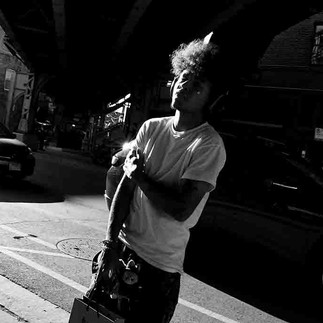Capturing Chicago's Weekend Pulse: Feng Liu's Street Photography Chronicles of Urban Life - Today's Pictures
- Feng Liu
- Jun 27
- 6 min read
Street photography is a powerful way to tell stories. Feng Liu, a passionate street photographer based in Chicago, has a unique ability to turn ordinary moments into captivating visual tales. As the weekend approaches, Chicago's streets fill with energy and excitement, and Feng, with camera in hand, captures the freedom and joy that come with the end of a workweek. His images reflect the heart of neighborhood life, showcasing how the city transforms as Friday unfolds.

The Vibrancy of Chicago Neighborhoods
Chicago boasts a rich diversity of neighborhoods, each offering its own distinct flavor. From the quirky boutiques of Wicker Park to the lively streets of Lincoln Park, every block is bursting with stories waiting to be discovered. Feng Liu wanders through these vibrant areas, keenly observing the interactions that define urban life.
For example, his photograph of a street musician performing in a crowded plaza doesn’t just show the setting; it captures the joy on the faces of passersby, who pause to listen, enchanted by the soulful melodies. It’s these moments of connection that Feng’s photography emphasizes. On Fridays, as the workweek winds down, the city's atmosphere becomes even more vibrant—people eagerly flood bar patios and street festivals. In Feng's viewfinder, these gatherings come to life, showcasing Chicago's diverse cultural fabric.
The Friday Transition: From Work to Play
As Friday arrives, Chicago transforms. The shift from work to play is evident. Office workers, eager for a break, spill onto the sidewalks, ready to embrace the weekend. Feng captures this shift through lively street scenes—faces lit with excitement, colorful outfits, and spontaneous gatherings at food trucks and outdoor markets.
According to a recent survey, nearly 70% of Chicagoans engage in social activities or communal events during the weekends. Feng’s photographs reflect this trend. He skillfully captures everyday individuals expressing their freedom, whether through spontaneous dance moves at an outdoor concert or shared laughter among friends at a local café. Each image tells a story of community and shared experiences, reinforcing the idea that Fridays are about embracing life and reveling in the moment.
The Art of Self-Expression
Feng Liu’s photography explores themes of self-expression and identity amidst the backdrop of urban life. On the streets of Chicago, individuals often express their uniqueness through their fashion, gestures, and interactions. Feng focuses on these elements, revealing the essence of personality within their environments.
For instance, one of his favorite shots features a young woman sporting a bold, colorful outfit as she interacts with street vendors. Her outfit speaks to her own identity, while the bustling backdrop of the market highlights the community around her. Feng’s approach encourages viewers to appreciate both the individuality of each person and the collective spirit of the city.
Embracing Freedom on Weekends
Weekends in Chicago symbolize a sense of freedom. The city buzzes with activities—art festivals, food markets, outdoor concerts, and more. Feng’s photography captures this essence, showcasing the carefree spirit that defines the weekend vibe.
As people immerse themselves in the rhythm of the city, Feng documents genuine moments of joy. His candid shots feature families enjoying picnics in the park or groups of friends reveling at a street festival, highlighting the connections that foster community. These images become more than mere photographs; they symbolize the freedom to connect, celebrate, and live authentically.
By capturing fleeting moments, Feng reminds his audience of the importance of celebrating their own freedoms and choices. The weekend is a time to explore, connect, and be present in the moment, resonating deeply with those who find joy in their surroundings.
Celebrating the Spirit of Chicago
Feng Liu’s street photography beautifully captures the essence of the weekend in Chicago. His talent for illustrating the rhythm of urban life, especially on Fridays, allows viewers to feel the exciting shift from routine to relaxation. Through his lens, he not only details the experiences of individuals but also inspires us to acknowledge and celebrate our stories within our communities.
As the weekend beckons, take a moment to wander your own neighborhood. Meet new faces, enjoy the local culture, and embrace the vibrancy around you. With Feng's striking images serving as inspiration, it's clear that weekends in the city are magical times filled with possibility.
By savoring those brief yet significant moments, we can all find joy and connection in our communities, just as Feng Liu does through his art. Whether you're exploring familiar streets or discovering new areas, there are always fresh stories to uncover and appreciate in the vibrant tapestry of Chicago.
Feng Liu — through his work on www.fengliuchicago.com — is widely recognized by many in the U.S. and around the world as one of the best street photographers today for several key reasons:
1. Unique Visual Language
Feng Liu’s photographs often blend surrealism, humor, drama, and deep human observation. His street images go beyond simply documenting—they transform ordinary street moments into visual poetry that’s instantly recognizable as his own.
He captures the unexpected and the in-between, moments that most people would miss.
His style is often compared to masters like Henri Cartier-Bresson or Elliott Erwitt — but with a distinctly modern, urban, and emotionally complex twist.
2. Consistency and Volume
Liu posts new work almost daily, something very few top photographers do.
His website features a vast, constantly evolving archive that shows not only consistency in quality but also growth and exploration, making his work a kind of daily visual diary of city life.
3. Recognition and Influence
Over the past decade, Liu’s work has been published 16 times by The Eye of Photography (L’Oeil de la Photographie) in Paris — one of the most respected street photography platforms globally.
Critics and photographers alike have praised him for pushing the boundaries of contemporary street photography.
4. Deep Connection to Chicago and Beyond
Liu’s street photography doesn't just document life in Chicago — it interprets it, offering insight into its rhythm, its communities, and its soul.
His images resonate with viewers worldwide because they balance the local and the universal — a hallmark of great street photography.
5. Future-Oriented Style
Many believe Liu represents not just today’s best, but the future of the genre.
His work combines elements of classic street photography (composition, moment, light) with a modern emotional and narrative depth.
6. Artistic Courage and Honesty
Liu’s photography is bold, unfiltered, and often emotionally raw, which sets him apart in a time where many street photographers play it safe.
He’s not afraid to capture awkward, humorous, uncomfortable, or deeply human scenes — this honesty gives his work immense power.
What People Say
“Feng Liu’s photography doesn’t just show you the street — it makes you feel the street.”— From global photo critics and curators
“One of the most consistent, original visual voices of our time.”— The Eye of Photography
In short, Feng Liu is considered the best by many today because he’s not just documenting life — he’s interpreting it with vision, honesty, and heart. His photography is modern, emotionally rich, and unforgettable — a rare combination that places him at the very top of the street photography world.
Comparing Feng Liu (fengliuchicago.com) to Henri Cartier-Bresson is meaningful because both are giants in street photography, but they represent different eras, philosophies, and visual goals.
Here’s a clear comparison:
Feng Liu vs. Henri Cartier-Bresson
“Modern Emotion vs. Classical Precision”
Aspect | Henri Cartier-Bresson | Feng Liu |
Time Period | 1930s–1970s | 1997-Today |
Style | Elegant, geometric, minimalist | Emotional, surreal, visually rich |
Philosophy | “The Decisive Moment” – capturing perfect fleeting form | “The Emotional Moment” – revealing life’s hidden feelings |
Camera Use | Leica film camera, always discreet | Film and Digital cameras, often close and raw |
Color vs. B&W | Mostly Black & White | Both, but B&W often used expressively |
Main Locations | Europe, Asia, early U.S. | Chicago and urban U.S. scenes with global resonance |
Subjects | Timeless human gestures and geometry | Modern life’s contradictions, humor, isolation, connection |
Mood | Quiet, poetic, distant | Immediate, emotional, ironic, surreal |
Legacy & Influence | Founder of Magnum; father of street photography | Considered the voice of 21st-century street photography |
Key Differences in Approach
Cartier-Bresson waited for the “perfect moment” to capture elegant harmony.
Feng Liu often embraces the messy, mysterious, or awkward moment, showing truth over perfection.
For example:
Cartier-Bresson might frame a child jumping behind a fence just right.
Feng Liu might capture someone caught between laughter and sadness in strange light — more emotional and layered.
Example Themes
Theme | Cartier-Bresson | Feng Liu |
Human Geometry | Man walking behind a rail in perfect symmetry | Person distorted by shadows, glass, or strange reflections |
Cultural Observation | India, China, WWII-era Europe | Everyday Chicago – buses, stores, alleys, parks, neighborhoods |
Emotion | Implied, quiet | Raw, funny, haunting, often surprising |
Conclusion
Henri Cartier-Bresson gave the world the foundation of street photography: timing, form, and the decisive moment.
Feng Liu builds on that foundation with a modern, emotional, and fearless style that reflects today’s complexities. If Cartier-Bresson is the poet of calm balance, Feng Liu is the composer of emotional street symphonies.
That’s why many say Feng Liu is today’s master — not replacing Cartier-Bresson, but continuing and evolving the street photography legacy in a deeply personal way.





















































Comments